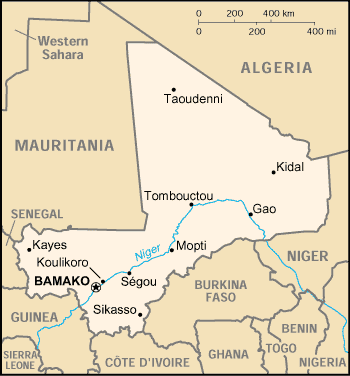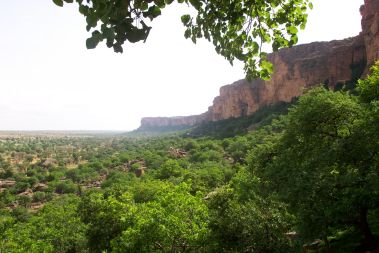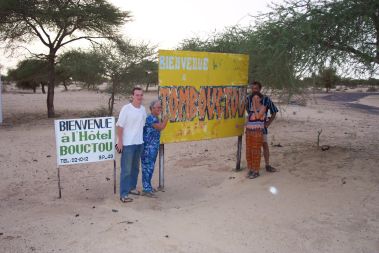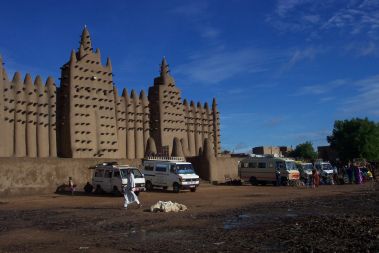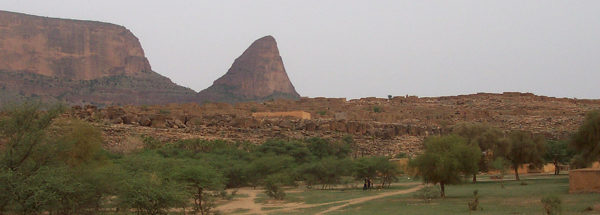Mali
Introduction
Mali is a large country located in central West Africa. It is a country of wonderful landscape including the barren dunes of the Sahara to the north and the spectacular cliffs of the Dogon valley to the south.
This is a predominantly Muslim country and the primary language is French though people also speak as many as four or five other languages including Bambara, Mandinka and Taureg (the people of the desert).
Visa Requirements
A tourist visa is required to visit Mali. These are available at any Malian embassy (such as in Dakar) or, if you are flying, at the Bamako airport. You should note, however, that arriving by land into Mali without a Visa is NOT advisable.
Weather
The weather in Mali is generally hot. With the summer season essentially from January to June and the rainy season from about July to October where it will generally rain once a day for a short period.
I traveled to Mali during the rainy season that is supposed to be the hottest time of the year but I found the countryside wonderfully green and lush. It was very hot though. The bulk of the tourists visit during the “winter” months (November to March) when you can be assured that the bumsters will be out in full-force. Which brings me to…
Hassle Evaluation
I had bumsters bothering me pretty much everywhere though they were more persistent and aggravating in some places than others. I found Timbuktu had the most persistent hassle with people offering to sell you Tuareg gifts and following you pretty much everywhere with “no” not seeming to have too much of an effect. One time I was walking away saying “no” over and over again as the man dropped his price more and more (obviously we were the “hard sell”) following me quite a distance down the street. I swear he went down to about 25% of what he originally wanted! If he had followed me further…10%?
To be honest though, the hassle I experienced in Mali was pretty similar to what I have faced in other West African countries.
Travel
Travel around the country is made possible by an excellent series of roads and very good public transport including numerous bus companies. Daily train service is provided between Kayes and Bamako as well as a (supposedly) bi-weekly service between Dakar (Senegal) and Bamako which takes (according to the schedule) about 36 hours (more likely 48 or more depending on which train is in operation).
Local transport is via normal taxis, “sept place” (large Peugeot car seating, supposedly, 7 people though more often more than that), or “bâche” (typically the back of a pick-up truck or the inside of a van with a bench all around the back and covered with a roof).
Accommodation
Generally, every major town will have at least one hotel as well as a “Campement” which is a small place for tourists to stay offering basic rooms (and roofs) along with food. Campements are common in many small villages as well including in <a href=“dogon.html”>Pays Dogon. If you can and the facilities are available, the roof is a good option when it is quite hot outside as the nights tend to be a lot cooler though mosquito protection is really a must (Malaria kills).
Personal Security
Bamako is a big city and as such the normal precautions should be taken.
Health
There are a number of recommended immunizations (see your doctor for details) though most importantly Malaria which is quite a problem in Mali. You cannot be immunized against Malaria but you can take anti-malaria pills which will minimize the effects of the disease which is spread via a (particular type of) mosquito bite.
Utility Infrastructure
Electricity and water is generally available in all major towns or cities. In the rural areas electricity is non-existent and water is provided by wells.
Internet
Public Internet access is available throughout the country (even in Timbuctu) – at a price.
Money
The unit of currency is the West African CFA.
Banks will generally not exchange any currency other than Euros though you can find exchange agents who will. Bank machines (the few there are in Bamako) only work with local bank cards.
Rumours are that you can use Visa in some hotels (likely the more expensive) and you can get a Visa advance from the BDA bank (for a fee).
What to See
Well, there is a lot to see in Mali with spectacular scenery to boot. My recommendations would be (in order of preference):
- Visit Pays Dogon (Dogon Country) - Fantastic villages in stunning scenery. Be aware that if you do any trekking here the walking can be quite tiring particularly the walk up and down the escarpment.
- Visit Timbuctu (Tombouctou) - If you can get there, it is a very small town but has it's own feel (though a LOT of hassle on the streets). Make sure that you plan your return journey BEFORE you go there as returning from Timbuktu is difficult (and expensive) though not impossible.
- Visit Djenne - Great mosque but an even more interesting town that seems to be lost in time. Market on Monday is OK but not that fantastic with things you would see in any big market in Africa. Lots of tourists visit on Mondays.
- Visit Segou - If you can stop there, this is a great place (and convenient) to relax before moving on to whatever else you have planned for your visit. I would strongly recommend the Djouliba Hotel as a great place (and very reasonable prices, the “terrace” is quite pleasant and cheap) to spend your nights. There is not a lot to see here though the market is quite good as is the pottery market. You can also take the public pinasses across to a local Bozo village (or take one of the bumsters up on their offer of a private hire…) to see that but we never had the opportunity to do this (and we had seen a LOT of villages by then).
- Visit Hombori (if you can) - A very unique place with the main village at the bottom of a small mountain with the older portion (still inhabited) a rather interesting short walk up the mountain. Spectacular scenery but a bit of a distance away from anything though on the road back from Gao (or a short distance from Douentza). If you do visit I would strongly recommend staying at the “Auberge” (just a short distance from the road – follow the signs) which has basic but clean facilities (including immaculate open-roofed showers and toilets) at a reasonable price.
Further Information
For further information, please see:
- Mali Journal - The journal of my visit to Mali in Summer 2004
- So You Want to Go to Mali? (so_you_want_to_go_to_mali.doc or so_you_want_to_go_to_mali.pdf)
- MaliPages - “Yellow Pages” of businesses/offices in Mali
- CIA World FactBook - Mali
- Mali on the Internet - List of sites containing information about Mali

